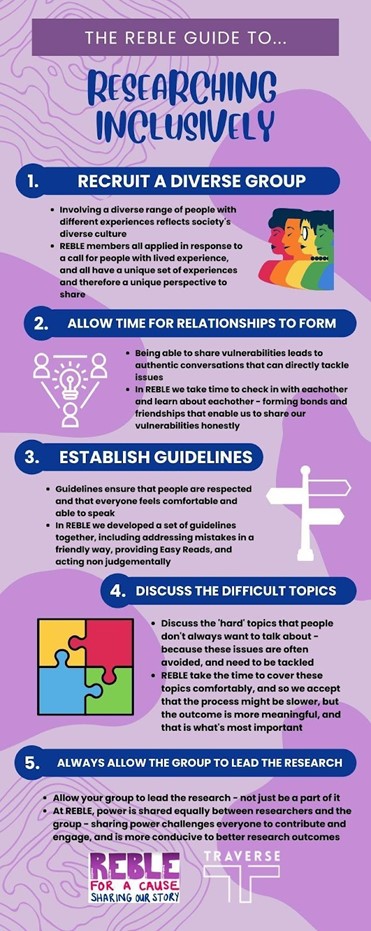Whether purposeful or not, many research groups present a false appearance of inclusiveness, and those involved do not actually have the expected influence - widening the gap between policy aims, and the reality of practice. In this context, ‘tokenism’ is the superficial involvement of a group in a decision making process, in a way that is not truly inclusive and does not share power in how that decision is made. As a modern society we have been trying to conduct better research under the banner of co-production for the past 30 years and yet it still remains tokenistic.
Bearing this in mind, social purpose consultancy Traverse created a group to embody a change in inclusive research and social justice. Their hope is to take this learning out to the wider research community.
The self-titled 'REBLE' - Researchers Empowered by Lived Experience - were formed in February 2021, following a call for people with different lived experiences to join an advisory panel and share their experiences. REBLE is comprised of 10 individuals who come from different backgrounds and who have lived very different lives, be this due to our ethnicities, disabilities, neurodiversity, location, or otherwise. As REBLE members we are all paid for our time.
Since REBLE’s creation we have met up at least monthly to talk about the many barriers to inclusivity within our society and throughout research. The group is facilitated by someone trained in Process Work and this way of facilitating enables the group to go deeper, build trust, make mistakes, bring our humanness in, and truly begin to explore what inclusive research means.
REBLE have taken steps to do things differently - to avoid tokenism. We've worked together with Traverse to have real impact; and with that, we present to you ‘The REBLE guide to working inclusively’:

Why is it important to avoid tokenism in research?
Simply put, tokenism prevents understanding, and if we as a society want to grow and be inclusive, to create equal opportunities, and to benefit from the skills and qualities of different types of people, we need to be able to actually have true understanding. If we get the research right, the services, outcomes, communities and society we live in becomes more relevant, more inclusive, more effective, and more meaningful.
In particular, avoiding tokenism in inclusive, powerful research, means:
- That research is applicable to our world. Diversity equates to relevance in the unique world we live in. If research is diverse, then it will reflect our culture, and that means we can apply findings to the real world.
- We can benefit from the experiences and opinions of others. If we are able to actually give a voice to a range of people, we can learn from them, and become richer and better people ourselves.
- Better working. In general, being truly inclusive creates trust and shows respect, and this in turn creates better relationships between people, and better performance. Being inclusive leads to stronger commitment, shared values, and people feeling able to be their whole selves.
Our experiences in REBLE so far have overall been extremely positive, and most importantly what we can all see is that people are willing to learn, and that is an amazing thing.
However, something we all, as REBLE, think is important is that this learning and work has wider impact. We want to see a future of social research that is more challenging but has authenticity, accuracy, and greater benefit to all.
The Shaping Our Lives Service User Involvement Report 2022 described that 'a number of people mentioned concerns about trust when sharing their personal stories and reported that feedback about negative experiences was sometimes unwelcome and prevented by organisations. This left some people feeling used and believing that the involvement process was ‘tokenistic’.
Truly inclusive research means allowing those that are disenfranchised to have an actual impact on the research - its structure and its outcomes. Not just answering questions. When power is shared with the oppressed the outcomes are transformational for individuals and for our society.
The potential for growth is infinite, so now we leave you with one simple question: what will you do differently?
Find out more about REBLE with a Cause, an event where we shared our learning to date about setting up a lived experience research panel.
To find out more about REBLE, contact Sue Newell, senior consultant at Traverse [email protected]